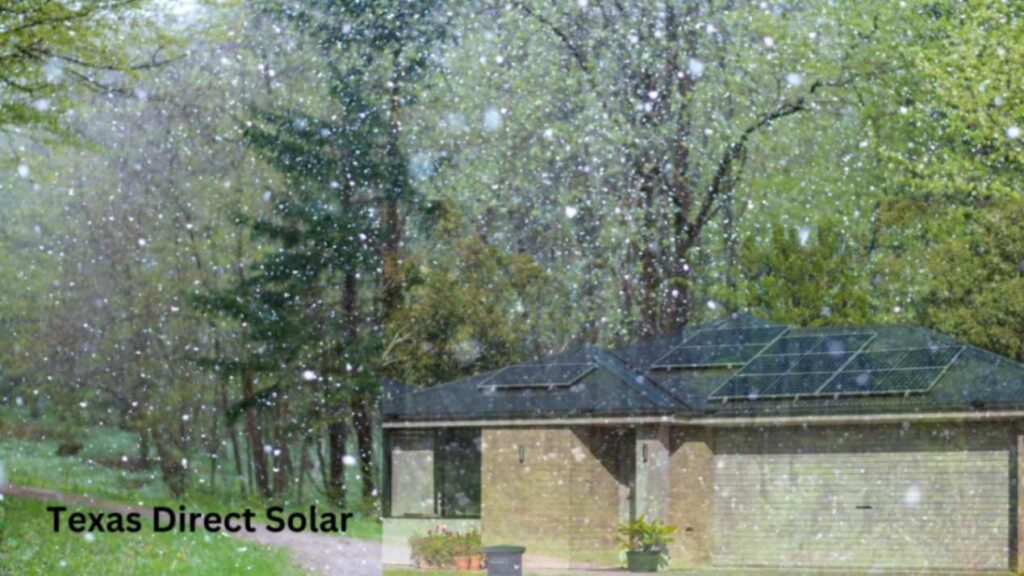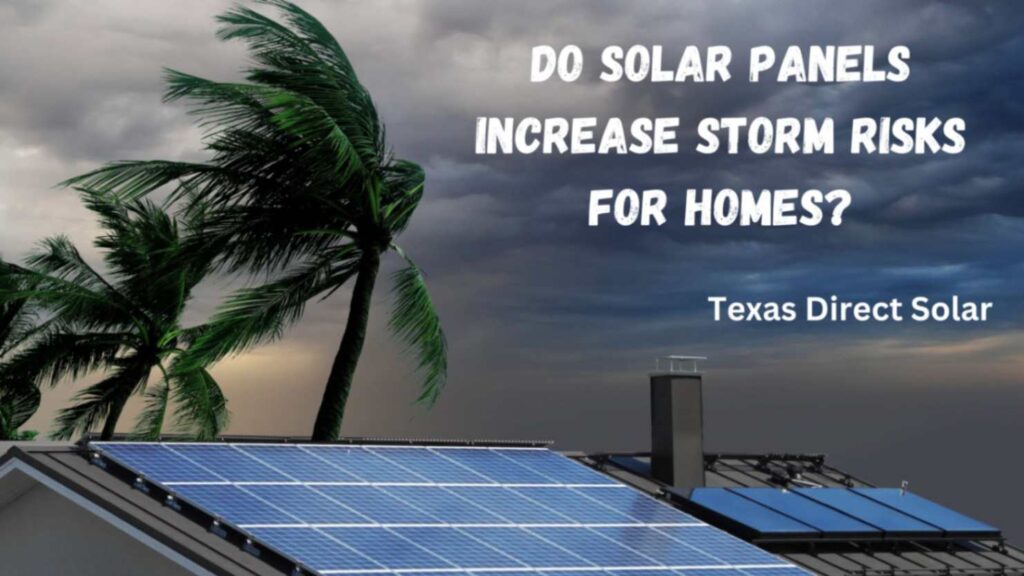We have seen the increasing trend of using renewable energy in Texas and all over the USA. Texas is popular for its unpredictable weather, facing hailstorms, tornadoes, hurricanes, and thunderstorms. Usually, people are confused when they plan for solar installation. Despite the usability and benefits of solar, they come up with a question Do solar panels increase the risk of storm damage to homes? This cannot be answered in a simple ‘Yes’ or ‘No’.
Solar panels are usually designed to tolerate such weather conditions, but it depends on a few factors, like whether they are properly installed. Quality of the components used in installation, and are they receiving proper maintenance by the owner? In this guide, we will discuss all the potential risks and benefits to give you a clear understanding of whether your decision to install solar panels for your Texas home or business is right or not.
By the end of the article, you will be clear about the ability of solar panels to handle harsh weather and whether it impacts your roof’s durability positively.
How Solar Panels Handle Texas Storms
Texas has extreme unpredictable weather like harsh winds, hurricanes and tornadoes. Are solar panels capable to handle these weather conditions and its impacts on your roof? Let’s discuss.
1. Wind Resistance of Solar Panels
Solar panels are designed to tolerate high winds, but there are some conditions:
- Quality Mounting Systems: If the panels and poorly installed with low quality components it can detach from the roof during extreme weather and harsh winds. Panels must be installed with hurricane-proof mounting systems to stay secure even during strong gusts.
- Wind Load Ratings: Modern solar panels have a feature of wind load rating. These panels can handle wind exceeding 140 mph. Texan’s must install these solar panels to avoid damage in harsh weather.
When you hire acertified installer, ask him to perform a wind resistance assessment to ensure your system’s durability.
2. Water Infiltration and Roof Durability
Often homeowner seems worried about water infiltration or leakage after solar installation during heavy rainfall or storm. Poor installation and lack of maintenance can result in many issues and your roof integrity can be compromised.
- Sealed Penetrations: Professional solar installers use flashing techniques and strong seals to prevent water leakages around the mounts. You must regularly inspect for potential wear and tear, so it can be treated early.
- Enhanced Roof Protection: Solar panels can protect your roof from direct sun exposure harsh weather, enhancing durability of your roof.
| Factor | With Solar Panels | Without Solar Panels |
|---|---|---|
| Wind Resistance | Depends on installation quality | Direct exposure to winds |
| Water Infiltration Risk | Proper installation minimizes | Lower risk without penetrations |
| Roof Durability | Shields roof from UV and rain | Full exposure to elements |
3. Hail Damage and Solar Panels

We as Texans, often faces hail storm, which looks beautiful but is point of concern for solar homeowners. Don’t worry we are here to relax your mind and you can enjoy this weather without worrying because:
- Durability: Solar panels always go through massive testing and are designed to hold out against golf ball-sized hail at speeds of up to 50 mph.
- Hail Warranty: Some manufacturers also offer warranties against hail damage, which is sigh of relief for Texas homeowners. Always select the panels with warranties in case of weather damage.
Do Solar Panels Attract Tornadoes?
We have seen many homeowner’s feels reluctant for installing solar panels, following a myth that solar panels attract severe weather, such as tornadoes. This myth has no scientific value and evidence. Tornadoes are completely natural and solar panels cannot influence them in any way.
Solar Panel Safety during Hurricanes and Snow

Solar panels built for hurricane-prone regions are tested for extreme wind speeds. These are highly durable and can only can be damaged if poorly installed. High winds can blow away solar panels, if the mounting is poor. Professional installers in Texas are familiar with local standards, ensuring your panels meet the necessary codes.
In the case of snowfall, it can easily shed the light snow due to their tilted position. The point of concern is the heavy snowfall and loss of power, which can put high pressure on PV due to the weight of snowfall. In such cases chances of cracks are higher. Consider adding a solar battery for storage during storm-related power outages.
Solar Panel Risk Assessment: What You Need to Know
Before installing solar panels, conduct a risk assessment to understand how your home’s structure might be affected:
- Roof Age: Ensure your roof is in good condition before installation. If your roof is nearing the end of its lifespan, replace it before adding solar panels.
- Building Codes: Follow local building codes, which account for weather patterns in your region, including wind speeds and snow loads.
- Solar Panel Materials: Choose high-quality materials that are certified for extreme weather conditions, including impact-resistant glass.
Mitigating Solar System Risks in Extreme Weather
Reducing the risk of damage during severe weather involves several preventive measures:
- Regular Maintenance: Schedule yearly inspections to check seals, mounts, and panel integrity.
- Secure Mounting: Use reinforced mounts and brackets that exceed local code requirements.
- Advanced Monitoring: Modern systems have monitoring tools that detect performance drops, signaling potential damage before it becomes serious.
- Weather Alerts: Keep an eye on weather forecasts and consider covering panels with protective tarps if severe hail is predicted.
How Solar Panels Can Protect Your Home
While some fear that solar panels make homes more vulnerable to storms, they can also offer unexpected benefits:
- UV Shield: Solar panels block harmful UV rays, reducing roof degradation.
- Energy Independence: During storm-induced outages, a well-maintained solar system with battery backup can provide critical power for lights, appliances, and medical devices.
- Cost Savings: Over time, solar panels save on energy costs, potentially covering repairs if any damage does occur during severe weather.
Conclusion: Are Solar Panels Worth It?
The bottom line? Properly installed solar panels do not inherently increase storm risks. They can offer protection, energy security, and cost savings in Texas’s unpredictable weather. Choosing a certified, experienced installer and investing in quality equipment are the keys to ensuring your solar investment is safe, secure, and beneficial, no matter the weather.
If you’re considering solar panels and have questions about how they perform in Texas’s unique climate, don’t hesitate to reach out to a trusted solar provider. Taking the right precautions can make solar power a safe and smart choice for your home or business.
Ready to harness the power of the sun without compromising your home’s safety? Contact a reputable solar provider today for a free consultation!
By addressing your concerns about storm risks and providing valuable information, we hope this guide has clarified the truth about solar panels and storm safety.

